(完整版)一般过去时及特殊疑问句
(完整版)一般过去时讲解及练习
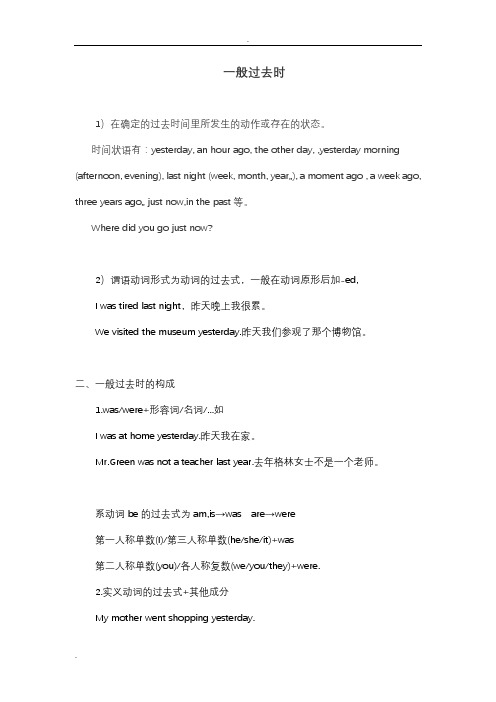
一般过去时1)在确定的过去时间里所发生的动作或存在的状态。
时间状语有:yesterday, an hour ago, the other day, ,yesterday morning (afternoon, evening), last night (week, month, year…), a moment ago , a week ago, three years ago… just now,in the past等。
Where did you go just now?2)谓语动词形式为动词的过去式,一般在动词原形后加-ed,I was tired last night,昨天晚上我很累。
We visited the museum yesterday.昨天我们参观了那个博物馆。
二、一般过去时的构成1.was/were+形容词/名词/...如I was at home yesterday.昨天我在家。
Mr.Green was not a teacher last year.去年格林女士不是一个老师。
系动词be的过去式为am,is→was are→were第一人称单数(I)/第三人称单数(he/she/it)+was第二人称单数(you)/各人称复数(we/you/they)+were.2.实义动词的过去式+其他成分My mother went shopping yesterday.我妈妈昨天去购物了。
His uncle worked in Beijing in 2014.他叔叔2014年在北京工作。
三、一般过去时的句式四、动词过去式的变化规则3 used toused to + do:"过去常常"表示过去习惯性的动作或状态,但如今已不存在。
Mother used to take a walk. (过去常常散步)二、构成及变化1. Be动词在一般过去时中的变化:am 和is在一般过去时中变为was。
(完整版)一般过去时及特殊疑问句
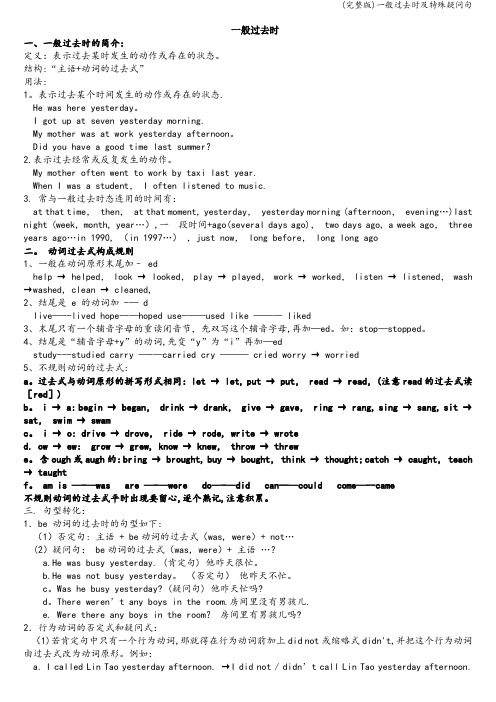
一般过去时一、一般过去时的简介:定义:表示过去某时发生的动作或存在的状态。
结构:“主语+动词的过去式”用法:1。
表示过去某个时间发生的动作或存在的状态.He was here yesterday。
I got up at seven yesterday morning.My mother was at work yesterday afternoon。
Did you have a good time last summer?2.表示过去经常或反复发生的动作。
My mother often went to work by taxi last year.When I was a student, I often listened to music.3. 常与一般过去时态连用的时间有:at that time, then, at that moment, yesterday, yesterday morning (afternoon, evening…)last night (week, month, year…),一段时间+ago(several days ago), two days ago, a week ago, three years ago…in 1990, (in 1997…),just now, long before, long long ago二。
动词过去式构成规则1、一般在动词原形末尾加– edhelp → helped, look → looked, play → played, work → worked, listen → listened, wash →washed, clean → cleaned,2、结尾是 e 的动词加 -— dlive—--lived hope--—hoped use-——used like ——— liked3、末尾只有一个辅音字母的重读闭音节,先双写这个辅音字母,再加—ed。
(完整)小学英语语法时态一般过去时详解
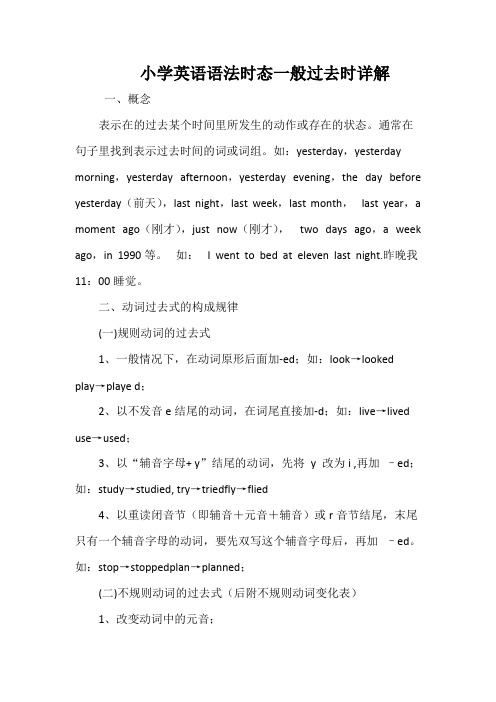
小学英语语法时态一般过去时详解一、概念表示在的过去某个时间里所发生的动作或存在的状态。
通常在句子里找到表示过去时间的词或词组。
如:yesterday,yesterday morning,yesterday afternoon,yesterday evening,the day before yesterday(前天),last night,last week,last month,last year,a moment ago(刚才),just now(刚才),two days ago,a week ago,in 1990等。
如:I went to bed at eleven last night.昨晚我11:00睡觉。
二、动词过去式的构成规律(一)规则动词的过去式1、一般情况下,在动词原形后面加-ed;如:look→looked play→playe d;2、以不发音e结尾的动词,在词尾直接加-d;如:live→lived use→used;3、以“辅音字母+ y”结尾的动词,先将y 改为i ,再加–ed;如:study→studied, try→triedfly→flied4、以重读闭音节(即辅音+元音+辅音)或r音节结尾,末尾只有一个辅音字母的动词,要先双写这个辅音字母后,再加–ed。
如:stop→stoppedplan→planned;(二)不规则动词的过去式(后附不规则动词变化表)1、改变动词中的元音;begin→began drink→drank come→came eat→ate grow→grew run→ran know→knew win→wonspeak→spoketake→took write→wrote get→got2、变词尾的–d 为–t ;build→built lend→lent send→sent spend→spent bend→bent3、与动词原形一样;cut→cut put→put cost→cost hurt→hurt shut→shut4、变-ay 为-aid (少数动词);say→said pay→paid lay→laid5、采用不同词根;sell→sold teach→taught buy→bought6、其他。
一般过去时特殊疑问句的构成
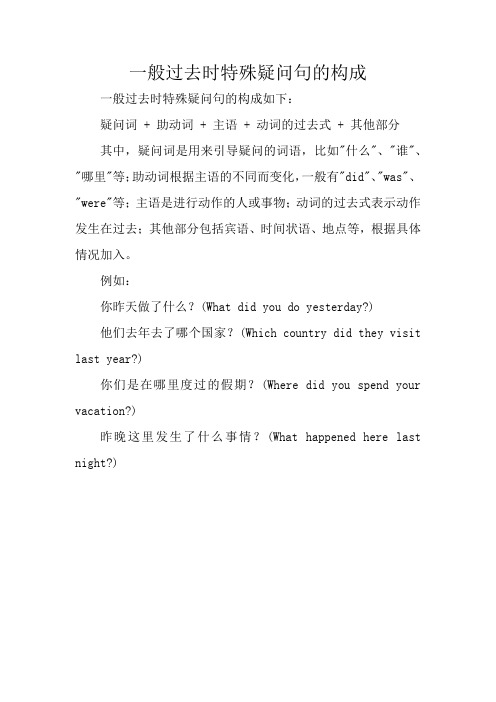
一般过去时特殊疑问句的构成一般过去时特殊疑问句的构成如下:
疑问词 + 助动词 + 主语 + 动词的过去式 + 其他部分
其中,疑问词是用来引导疑问的词语,比如"什么"、"谁"、"哪里"等;助动词根据主语的不同而变化,一般有"did"、"was"、"were"等;主语是进行动作的人或事物;动词的过去式表示动作发生在过去;其他部分包括宾语、时间状语、地点等,根据具体情况加入。
例如:
你昨天做了什么?(What did you do yesterday?)
他们去年去了哪个国家?(Which country did they visit last year?)
你们是在哪里度过的假期?(Where did you spend your vacation?)
昨晚这里发生了什么事情?(What happened here last night?)。
(完整版)一般过去时态总结
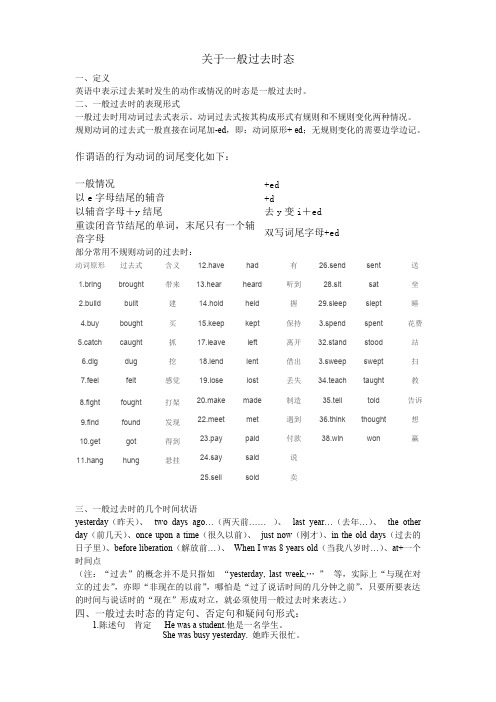
关于一般过去时态一、定义英语中表示过去某时发生的动作或情况的时态是一般过去时。
二、一般过去时的表现形式一般过去时用动词过去式表示。
动词过去式按其构成形式有规则和不规则变化两种情况。
规则动词的过去式一般直接在词尾加-ed,即:动词原形+ ed;无规则变化的需要边学边记。
作谓语的行为动词的词尾变化如下:一般情况+ed以e字母结尾的辅音+d以辅音字母+y结尾去y变i+ed重读闭音节结尾的单词,末尾只有一个辅音字母双写词尾字母+ed部分常用不规则动词的过去时:动词原形过去式含义1.bring brought带来2.build built建4.buy bought买5.catch caught抓6.dig dug挖7.feel felt感觉8.fight fought打架9.find found发现10.get got得到11.hang hung悬挂12.have had有13.hear heard听到14.hold held握15.keep kept保持17.leave left离开18.lend lent借出19.lose lost丢失20.make made制造22.meet met遇到23.pay paid付款24.say said说25.sell sold卖26.send sent送28.sit sat坐29.sleep slept睡3.spend spent花费32.stand stood站3.sweep swept扫34.teach taught教35.tell told告诉36.think thought想38.win won赢三、一般过去时的几个时间状语yesterday(昨天)、two days ago…(两天前…… )、last year…(去年…)、the other day(前几天)、once upon a time(很久以前)、just now(刚才)、in the old days(过去的日子里)、before liberation(解放前…)、When I was 8 years old(当我八岁时…)、at+一个时间点(注:“过去”的概念并不是只指如“yesterday, last week,…”等,实际上“与现在对立的过去”,亦即“非现在的以前”,哪怕是“过了说话时间的几分钟之前”,只要所要表达的时间与说话时的“现在”形成对立,就必须使用一般过去时来表达。
一般过去时的特殊疑问句
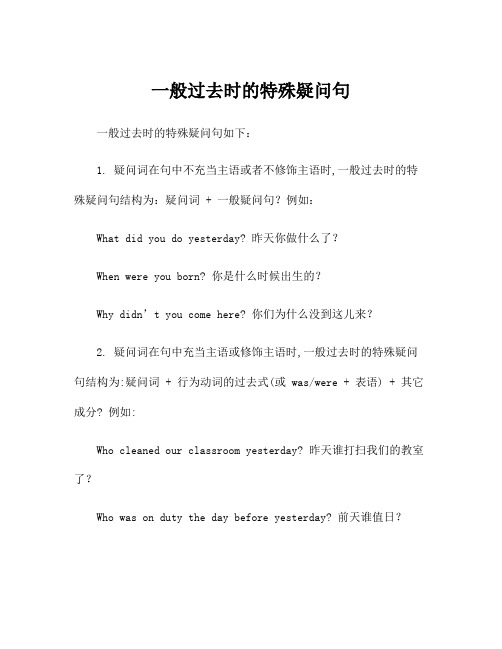
一般过去时的特殊疑问句
一般过去时的特殊疑问句如下:
1. 疑问词在句中不充当主语或者不修饰主语时,一般过去时的特殊疑问句结构为:疑问词 + 一般疑问句?例如:
What did you do yesterday? 昨天你做什么了?
When were you born? 你是什么时候出生的?
Why didn’t you come here? 你们为什么没到这儿来?
2. 疑问词在句中充当主语或修饰主语时,一般过去时的特殊疑问句结构为:疑问词 + 行为动词的过去式(或 was/were + 表语) + 其它成分? 例如:
Who cleaned our classroom yesterday? 昨天谁打扫我们的教室了?
Who was on duty the day before yesterday? 前天谁值日?
Whose father came to see our teacher just now? 刚才谁的父亲来看我们老师了?。
(完整版)英语时态总结(完整)
英语共有十六个时态、四个体.(注:四个体为——一般、进行、完成、完成进行。
)(1)一般现在时1. 概念:经常、反复发生的动作或行为及现在的某种状况。
2. 基本形式(以do为例):第三人称单数:does(主语为非第三人称单数);肯定句:主语+动词原形+其他;He works for us.否定句:主语+don‘t/doesn’t+动词原形+其他;He doesn't work for us.一般疑问句:Do/Does+主语+动词原形+其他。
肯定回答:Yes,(+主语+do/does).否定回答:No,(+主语+don’t/doesn't.)特殊疑问句:疑问词+一般疑问句语Does he work for us?Yes, he does。
No, he doesn’tWhat does he do for us?He works for us。
(2)一般过去时1。
概念:过去某个时间里发生的动作或状态;过去习惯性、经常性的动作、行为。
be动词+行为动词的过去式否定句式:在行为动词前加didn‘t,同时还原行为动词,或was/were+not;was或were放于句首;用助动词do的过去式did提问,同时还原行为动词例如: Did he work for us?He didn’t work for us.He worked for us。
(3)一般将来时1。
概念:表示将要发生的动作或存在的状态及打算、计划或准备做某事。
am/are/is+going to+do 或will/shall+doam/is/are/about to + doam/is/are to + do;一般将来时的表达方法be going to +动词原形be +不定式,be to+动词原形,be about to +动词原形be able to +不定式be about to+动词原形will + 动词原形;例如:He is going to work for us。
超详细一般过去时的全面讲解【附练习与答案】
一般过去时的全面讲解01、一般过去时的基本结构1. 肯定句形式:主语+动词过去式+其他例: I was an English teacher one year ago. 一年前我是一名英语老师。
I bought a yellow dress yesterday afternoon. 昨天下午我买了一条黄裙子。
2. 否定句形式:①was/were+not; ②在行为动词前加didn't,同时还原行为动词例:I wasn't an English teacher one year ago. 一年前我不是一名英语老师。
I didn't buy a yellow dress yesterday afternoon. 昨天下午我没买一条黄裙子。
3. 一般疑问句:①was/were提到句首;②Did+主语+动词原形+其他?例:Were you an English teacher one year ago? 一年前你是一名英语老师吗?Did you buy a yellow dress yesterday afternoon? 昨天下午你买了一条黄裙子吗?4. 特殊疑问句:特殊疑问词+一般疑问句例:What were you one year ago? 一年前你是做什么的?When did you buy a yellow dress? 你什么时候买了一条黄裙子?02一般过去时的基本用法1. 表示在过去某个时间所发生的动作或所处的状态(与现在无关)。
常与yesterday, last week, in 1989, just now, a moment ago, the other day等过去具体时间状语连用。
He was here just now. 他刚才还在这里。
What did you do yesterday? 你昨天做了什么事?2. 在过去一段时间内的经常性或习惯性动作。
一般过去时的特殊疑问句
02
Review
01
03
05
02
04
06
特殊疑问句ຫໍສະໝຸດ Review一般过去时
概念:① 表示过去某时间发生的动作或存在的状态. eg: I got up at six this morning. (表示过去的动作) He was a child ten years ago. (表示过去的状态) 表示过去的习惯或经常发生的动作. eg: He used to get up early in the morning.(表示过去的习惯) When I was in the countryside, I often swam in the river.(表示过去经常发生的动作)
Unit 1 Where did you go on vacation?
The summer vacation was over. Did you have a good time? Did you travel or just stay at home? Where did you go on vacation? Did you do anything interesting? What did you do on vacation?
Some Questions about Your Holiday
What did you do on your summer vacation? Where did you go on your summer vacation? How did you ... ? Whom did you .... ? When did you ... ? Why did you ... ?
结构: 肯定句:主语 + 谓语动词(be动词、行为动词)+ 其他。 I was ill last night. I visited my grandparents yesterday morning. 否定句:主语 + be (was/were) + not +其他 I wasn't ill last night. 主语 + didn’t + 动词原形+其他 I didn't visited my grandparents yesterday morning. 一般疑问句:将be动词或助动词did提前(注意谓语动词的人称变化)。 Were you ill last night? Did you visit your grandparents yesterday morning?
(完整版)一般过去时习题及答案
一般过去时一、用法1. 表示过去某个时间发生的动作或存在的状态。
I got up at 7:00 yesterday morning. 昨天早上我七点钟起床的。
2. 表示过去经常或反复发生的动作,可以与always, often, sometimes等频度副词连用。
I often had lunch at school last month. 上个月我经常在学校吃午餐。
二、表现形式1. 句中含有be动词,则be动词改成was (主语是第一或第三人称单数)或were (主语是第二人称或第一、三人称复数)。
I was at home at that time. 那时我在家里。
2. 如果句中有实义动词,使用实义动词的过去式。
She went to Jinan last Sunday. 上周日她去济南了。
3. 句式转换(1)含有be动词的一般过去时态的各种句式:①肯定句:主语+was/were+其他.Linda was thirteen last year. 去年琳达13岁。
②否定句:主语+was/were+not+其他.Mary was not good at math. 玛丽不擅长数学。
③一般疑问句:Was/Were+主语+其他?肯定回答:Yes, 主语+was/were.否定回答:No, 主语+was/were+not.—Was Mary ill last week? 上周玛丽生病了吗?—Yes, she was. 是的,她生病了。
(2)含有实义动词的一般过去时态的各种句式:①肯定句:主语+动词的过去式+其他.Mike went to the cinema yesterday evening. 昨天晚上迈克去看电影了。
②否定句:主语+didn't+动词原形+其他.My mother didn't go to work yesterday.昨天我妈妈没去上班。
③一般疑问句:Did+主语+动词原形+其他?肯定回答:Yes, 主语+did.否定回答:No, 主语+didn't.—Did she go to the zoo? 她去动物园了吗?—No, she didn't. 不,她没去。
- 1、下载文档前请自行甄别文档内容的完整性,平台不提供额外的编辑、内容补充、找答案等附加服务。
- 2、"仅部分预览"的文档,不可在线预览部分如存在完整性等问题,可反馈申请退款(可完整预览的文档不适用该条件!)。
- 3、如文档侵犯您的权益,请联系客服反馈,我们会尽快为您处理(人工客服工作时间:9:00-18:30)。
一般过去时一、一般过去时的简介:定义:表示过去某时发生的动作或存在的状态。
结构:“主语+动词的过去式”用法:1.表示过去某个时间发生的动作或存在的状态。
He was here yesterday.I got up at seven yesterday morning.My mother was at work yesterday afternoon.Did you have a good time last summer?2.表示过去经常或反复发生的动作。
My mother often went to work by taxi last year.When I was a student, I often listened to music.3. 常与一般过去时态连用的时间有:at that time, then, at that moment, yesterday, yesterday morning (afternoon, evening…)last night (week, month, year…),一段时间+ago(several days ago), two days ago, a week ago, three years ago…in 1990, (in 1997…) ,just now, long before, long long ago二. 动词过去式构成规则1、一般在动词原形末尾加–edhelp →helped, look →looked, play →played, work →worked, listen →listened, wash →washed, clean →cleaned,2、结尾是e 的动词加-- dlive---lived hope---hoped use---used like --- liked3、末尾只有一个辅音字母的重读闭音节,先双写这个辅音字母,再加-ed。
如:stop-stopped。
4、结尾是“辅音字母+y”的动词,先变“y”为“i”再加—edstudy---studied carry ---carried cry --- cried worry →worried5、不规则动词的过去式:a.过去式与动词原形的拼写形式相同:let →let, put →put, read →read,(注意read的过去式读[red])b. i →a: begin →began, drink →drank, give →gave, ring →rang, sing →sang, sit →sat, swim →swamc. i →o: drive →drove, ride →rode, write →wroted. ow →ew: grow →grew, know →knew, throw →threwe. 含ough或augh的:bring →brought, buy →bought, think →thought;catch →caught, teach →taughtf. am is ---was are ---were do---did can---could come---came不规则动词的过去式平时出现要留心,逐个熟记,注意积累。
三. 句型转化:1.be 动词的过去时的句型如下:(1)否定句:主语+ be动词的过去式(was, were)+ not…(2)疑问句:be动词的过去式(was, were)+ 主语…?a.He was busy yesterday. (肯定句) 他昨天很忙。
b.He was not busy yesterday. (否定句) 他昨天不忙。
c.Was he busy yesterday? (疑问句) 他昨天忙吗?d.There weren’t any boys in the room.房间里没有男孩儿。
e. Were there any boys in the room? 房间里有男孩儿吗?2.行为动词的否定式和疑问式:(1)若肯定句中只有一个行为动词,那就得在行为动词前加上did not或缩略式didn’t,并把这个行为动词由过去式改为动词原形。
例如:a. I called Lin Tao yesterday afternoon. →I did not / didn’t call Lin Tao yesterday afternoon.b. I borrowed a book from Sun Yang last Sunday. →I didn’t borrow a book from Sun Yang last Sunday.(2) 行为动词的一般疑问句若在陈述句中只有行为动词的过去式,那就得在句首加上一个助动词did来帮助提问,然后把句中的行为动词由过去式改为动词原形,并在句末打上问号。
回答时别忘了还用did.例如:a. We stayed there for 10 days last month. →Did you stay there for 10 days last month? Yes, we did. / No, we didn’t.b. Mary had a delicious dinner yesterday evening. →Did Mary have a delicious dinner yesterday evening? Yes, she did. / No, she didn’t练习:一.用所给动词的适当形式填空。
1. We ______ (live) in Japan last year.2. Susan_______ (stop) the car on the street yesterday.3. My mother_______ (clean) my room and ______(study) for the English test last Sunday.4. What ______ you ______(do) last night?5. On Saturday morning I _____(play) football.二.用括号内所给动词的适当形式填空。
(1) May__________ (finish) her homework very late yesterday evening.(2) Han Mei __________ (bring) her pet to the park that day.(3) His father __________ (buy) a new computer for him last week.(4) Miss Du__________ (walk) to work every day last term.(5) We __________ (move) to Shenyang 8 years ago.(6) __________ you __________ (have) bread for breakfast this morning?(7) She __________ (give) me a nice present last night.(8) The police __________ (stop) the car and __________ (catch) the thief (小偷) just now.(9) Tom __________ (carry) water for the old man last Saturday.(10)Uncle Wang _____________ ( come )into the room and __________ ( find ) something to eat.(11).Lily ______________ ( study ) in the classroom for two hours and then _________ ( leave ).(12).Jimmy __________ ( do ) a lot today. He _________ ( go ) shopping and ________ ( cook ) supper.(13).We _________ ( go ) to the cinema last night. The film ___________ ( be ) very good.(14).What time _________ you __________ ( get ) to school this morning?三.按要求变换下列句型,每空一词。
(1) Wei Fang cleaned the classroom an hour ago. (改为一般疑问句,并作肯定和否定回答) __________ Wei Fang __________ the classroom an hour ago?__________, she __________.__________,she __________.(2) Li Hong did her homework yesterday afternoon. (改为否定句)Li Hong __________ __________ her homework yesterday afternoon.(3) Uncle Li drove a truck to Wuhan three months ago(改成一般疑问句)__________ Uncle Li __________a truck to Wuhan three months ago?(4) Miss Gao taught them English last term.(对划线部分提问)__________ __________ Miss Gao __________ __________ English?(5) Mr Ren always went to work on foot last year. (对划线部分提问)__________Mr Gao ________ to work last year?(6)Lucy did her homework at home.(改否定句)Lucy _______ _______ her homework at home.(7)He found some meat in the fridge.(变一般疑问句)______ he _____ ______ meat in the fridge?(8)She stayed there for a month.(对划线部分提问)______ ______ _____ she _____ there?(9)There was some tea in the cup.(变一般疑问句)_____ there _____ tea in the cup?四. 选择( )1.The two __________in the same class last year.A. areB. wasC. were( )2.---Where__________ you ?----I went to buy some food for supper.A.are goB.did goC.do go( )3.The students in Li Lei’s class__________ on a farm last week.A. workB. worksC. worked( )4.__________ that worker __________in a shoe factory a year ago?A. Do, workB.Did, workedC. Did, work( )5.---Have you found your pen ?----Yes, I__________ it two hours ago.A. foundB. findC. finded( )6. __________your mother __________to work last Saturday?A. Did, goB. Do, goC. Does, go( )7.They__________ not late the day before yesterday.A. didB. wereC. are( )8.__________ they away from school last October?A. DidB. WereC. Do( )9. __________you__________ to school last Sunday?A. Did, comeB. Do, comeC. Were, come( )10.What __________they__________ for breakfast last week?A. were, haveB. did, haveC. will, have( )11.My friend __________his homework fifteen minutes ago.A. finishB. finishesC. finished( )12.The boys__________ only two subjects last term, but this term they__________ five.A. have, haveB. had, hadC. had, have( )13.Why __________Ann __________TV last night ?A. didn’t, watchB. don’t ,watchC. doesn’t , watch( )14.They stopped here because they__________ the way to the station.A. didn’t knowB. don’t knowC. will know( )15---Where __________ you find your ticket?----I __________it on the ground.A. did, foundB. do, foundC. were, find五.将下列各词重新排序使其成为正确的句子:1. you go the did to city yesterday (?)_______________________________2. did he what in eat evening the (?)______________________________3. went there I taxi by (.)______________________________4. walked to the she back school (.)______________________________5. it rainy was yesterday (?)______________________________答案一.1. lived 2.stopped 3.cleaned studied 4.did do 5.played二.1. finished 2.brought 3.bought 4.walked 5.moved 6. Did, have7. gave8.stopped, caught9.carried 10.came found.11.studied;left 12.did; went;cooked13.went;was 14.did;get三.1.Did; clean; Yes sh did/No she didn’t 2.didn’t do 3.Did drive 4.When; did ;teach them.5.How did go6.didn’t do7.Did find any8.How long did stay9.Was any四.1.C 2.B 3.C 4.C 5.A 6.A7.B8.B9.A10.B 11.C12.C 13.A14.A 15.A五.1.Did you go to the city yesterday?2.What did he eat in the evening?3.I went there by taxi.4.She walked back to the school.5. Was it rainy yesterday?特殊疑问句1. 定义:以特殊疑问词开头,对陈述句中的某一部分提出疑问 / 进行发问的句子叫特殊疑问句。
